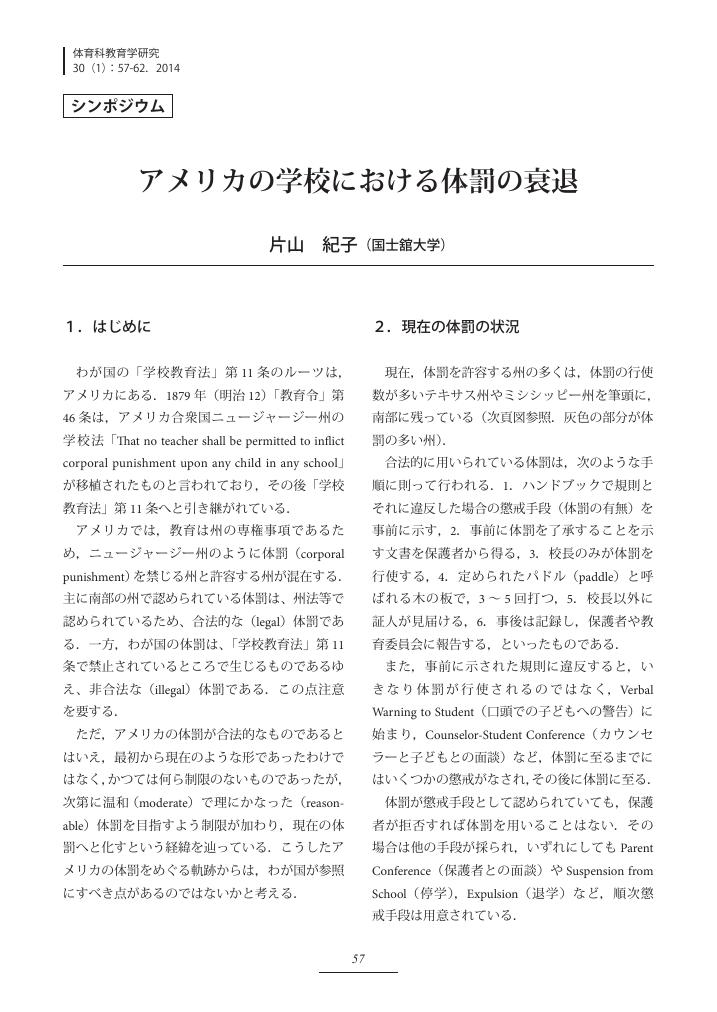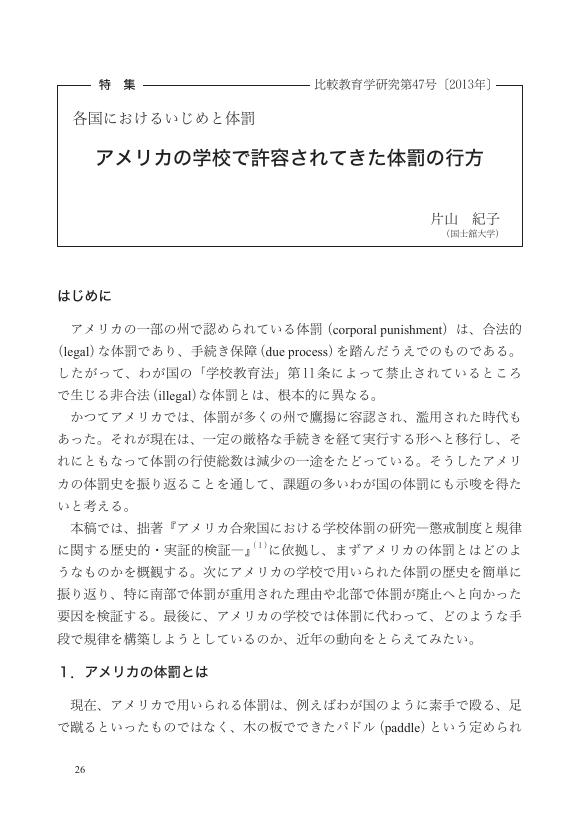7 0 0 0 OA アメリカの学校における体罰の衰退
- 著者
- 片山 紀子
- 出版者
- 日本体育科教育学会
- 雑誌
- 体育科教育学研究 (ISSN:13428039)
- 巻号頁・発行日
- vol.30, no.1, pp.57-62, 2014-03-15 (Released:2014-04-10)
- 参考文献数
- 4
4 0 0 0 IR アメリカ体罰問題の今日的特質と展望--州政策の方向に焦点をあてて
- 著者
- 片山 紀子 八尾坂 修 片山 紀子 八尾坂 修 KATAYAMA Noriko YAOSAKA Osamu
- 出版者
- 奈良教育大学教育研究所
- 雑誌
- 教育研究所紀要 (ISSN:13404415)
- 巻号頁・発行日
- no.34, pp.87-97, 1998-03
2 0 0 0 OA アメリカにおける生徒懲戒リスクの再検証と懲戒に関する施策の動向
- 著者
- 片山 紀子
- 出版者
- 日本比較教育学会
- 雑誌
- 比較教育学研究 (ISSN:09166785)
- 巻号頁・発行日
- vol.2004, no.30, pp.110-128, 2004-06-25 (Released:2011-01-27)
- 参考文献数
- 44
1 0 0 0 OA アメリカの学校で許容されてきた体罰の行方
1 0 0 0 OA アメリカ南部州において存続する学校体罰の成因
- 著者
- 片山 紀子
- 出版者
- 奈良女子大学
- 雑誌
- 人間形成と文化 : 奈良女子大学文学部教育文化情報学講座年報 (ISSN:13429817)
- 巻号頁・発行日
- vol.4, pp.115-126, 2000
In the West, historically in the context of education the corporal punishment has been used heavily. On this point, the situation in America was the same. However, the movement that many states of America prohibited corporal punishment appeared after 1980'. Yet, most of them are northern states, and the school corporal punishment remains in the south even now. The subject of this research is to clarify this reason. As a result of my study, the following reasons are conceivable. 1.The religious background; Above all, the existence of Fundamentalist is strong factor. They believe Christian Bible strictly and many of them live in the south. Therefore, southern area is called "Bible Belt" They are known to be conservative with discipline and like corporal punishment more to discipline a child than others. 2. The influence of the social structure ; The social structure of the southern states is different from the northern states. Including the slavery system, the social structure in the southern states has great influence on the education, the economic activities and the sense of values among people. By the unique social structure of the southern states, the corporal punishment is maintained to be used. 3. The ethos of the southern states ; It is unable to limit the basis of the corporal punishment that continues in the southern states only to these independent factors, such as the religion and social structure. Because they are mutually related factors, and form a/the particular southern ethos . I argue that the corporal punishment continued in the southern states is sustained by the ethos of the people in the south. As for our country, though the corporal punishment in school is legally prohibited, it continues even now. Thus, it may be possible to say that the ethos which allows the corporal punishment also exists in Japan even now.
1 0 0 0 IR NCLB法下に見るアメリカの幼児教育
- 著者
- 片山 紀子
- 出版者
- 京都教育大学
- 雑誌
- 京都教育大学紀要 (ISSN:03877833)
- 巻号頁・発行日
- vol.114, pp.63-75, 2009-03
アメリカ合衆国では,NCLB(No Child Left Behind Act of 2001: 落ちこぼれをつくらないための法)が2002 年にG. W. ブッシュ前大統領のもと成立した。NCLB 法は,人種間による学業成績の差を縮小し,学力向上達成のために,より高い責任を州や学校に求めている。本論文は,NCLB 法のもとキンダーガーテンやプレキンダーガーテン,そしてヘッドスタートがどのような余波を受けたのかを検討したものである。1980 年代後半以降,学力を目に見える形で測定する動きが強化され,就学前教育に相当するキンダーガーテンやプレキンダーガーテンでもリテラシーに重きが置かれるようになってきた。NCLB 法が成立するとさらに,キンダーガーテンの役割は子どもが近い将来学校に慣れる準備を幅広く手助けするというものから,小学校1 年生時点でのあるいは将来の人生の成功を意識した効率重視のものへと変化してきた。プレキンダーガーテンにおいてもまた同様に読み書きの学習が励行されている。検討の結果,初等・中等段階にとどまらず,ヘッドスタートを含むキンダーガーテンやプレキンダーガーテンでもNCLB 法のもとテストの波に飲み込まれ,相当の影響を受けていることがわかった。The No Child Left Behind Act (NCLB) was passed by the U.S. Congress, and signed by former President Bush on January 8,2002. The NCLB Act requires that states and schools ensure that all children get higher performance and that they diminish difference of achievement between white children and others. This paper examines the conditions and trends of kindergartens, prekindergartens and Head Start programs under the NCLB Act. Measurement of achievement and school readiness, had been intensified since the standards movement began in the late 1980s and even more stressed with the NCLB Act, which puts kindergartens and prekindergartens in a literacy bind. As a result, the kindergarten's mission has changed from helping children get used to school to preparing them to achieve in the first grade or later life. It is also the case with prekindergartens. Prekindergarten children also study reading and math as well as kindergarten children. It was evident that kindergarten and prekindergarten children including Head Start participants have lots of pressure under the NCLB Act.
1 0 0 0 IR アメリカに見る規律形成の今日的動向 : 体罰をめぐる議論を通して
- 著者
- 片山 紀子
- 出版者
- 京都教育大学
- 雑誌
- 京都教育大学紀要 (ISSN:03877833)
- 巻号頁・発行日
- no.126, pp.13-24, 2015-03
わが国では,学校における体罰は「学校教育法」11条により禁止されている。しかし,実際には,長い間,体罰への衝動に駆られ,懲戒処分に課される教員はこれまで後を絶たなかった。この一因には,体罰をめぐるオープンな議論が繰り広げられることを欠いてきたことが挙げられる。わが国の「学校教育法」第11条のルーツは,アメリカ合衆国にあるが,かつて体罰許容国であったアメリカでは,規律に向けた哲学に変容が見られ,教室経営や学校経営など,以前とは異なる施策をとるように変わってきた。


